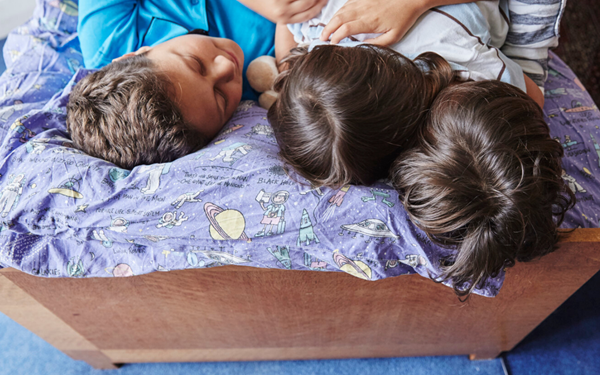Worried about a child?
Seen or heard something that worries you? It's always better to check with someone.
Call us free on 0808 800 5000, email [email protected] or fill in our online form.
When should a child legally have their own room?
As kids grow up they might want more privacy and need their own space, especially if they're sharing a bedroom with a brother or sister. While it's not illegal for them to share, it's recommended that children over the age of 10 should have their own bedrooms – even if they're siblings or step-siblings.
We know this isn't always possible. If kids are sharing, try to have regular conversations with them about how they're feeling. We've got tips and ideas to help make sure they're safe and happy sharing a room.
It's important to know there are laws in place to help make sure everyone's home is safe and comfortable. Legislation states that children of the opposite sex over the age of 10 should not share rooms - and that this can be considered overcrowding.1 Read more about how this might affect if you if you live in or are applying for social housing below.
Our advice about children sharing a room
If you’re trying to decide whether it’s a good idea for kids to share a bedroom, here are a few questions to consider.
- Do your children get on well? What's their relationship like?
- What is the age gap between your children? Will different bedtimes and morning schedules stop children getting their rest?
- How big is the room? Will there be enough storage and space for 2 or more children to live comfortably?
It's important you and your child both have some privacy and space for yourselves so we wouldn't recommend children sharing a room with a parent long-term.
If you have a baby or toddler, we have some advice about sleeping at different ages.
If you’re in council housing or your house is owned by a Housing Association, you’re entitled to a bedroom for every person over 16 years old (18 years old in Northern Ireland) and every married couple so you shouldn’t need to share a room with your child. You can read more about housing benefits below.
Even if sleeping arrangements are only for a short time – like on holiday or staying with someone else - parents or carers should decide in advance where everyone will be sleeping.
Speak to everyone individually and if anyone feels uncomfortable try to find an alternative that everyone is happy with.
Again, it's a good idea to talk to your children about safety before they stay away from home. For younger children remind them of The Underwear Rule and for older children you can see our tips on conversation starters. Tell them they can always speak to you or a trusted adult if anything makes them feel uncomfortable or is worrying them.
Talking to your child about sharing a room
Talk to your child about how they feel about where they're sleeping. If they don’t feel comfortable, ask them what’s worrying them. Sometimes there are reasons they're not comfortable and there might be things you can do to help.
Whether they are sharing at home or holiday, it is a good idea to talk about their safety. For younger children, talk to them about The Underwear Rule. You can try using our PANTS pack to help. If your children are older, try using our conversation starters.
Remind them that whatever happens, they can speak to you about anything that's worrying them.
Our tips for children sharing a bedroom safely
In some cases, sharing a room might mean changes to what they're used to so it's important to talk to them first to prepare them for the new routine. For example, if they'll be sharing with a baby or toddler or if one of your children has complex needs.
Let your children know what to expect and allow them some time to adapt if possible. You could try arranging some sleepovers first to give them a chance to get used to the new arrangements.
Sit down with your children and agree some ground rules for the room that everyone is happy with. Some things to think about include:
- Are there any toys that are off limits or aren't appropriate for the younger sibling? Can you provide them with separate storage so it's clear whose stuff is whose?
- If there’s a big age gap between your children what are the house rules when one has friends over to visit? Are they allowed to play together without supervision?
- Do your children get up and go to bed at different times? Think about setting a designated 'quiet time' – in the morning and at night – to make sure everyone's able to sleep properly.
Even if children are sharing a room, you could decorate so they each feel like they have their own space. If the move is recent or unexpected, this can help them get excited about sharing with someone else.
If there is a larger age gap between the children sharing or children of opposite sexes are sharing, there might be ways of creating some privacy with a screen or curtain rail. Talk to both children and try to understand their concerns, and discuss solutions together.
However, we would always recommend that boys and girls older than 10 do not share a room.
If there's an age gap between the children sharing, think about their current bedtimes and how they sleep.
Putting children to bed at the same time can mean that they stay up later than you planned so it is good to factor in some ‘settling down’ time when deciding on a bedtime for both.
If one child is younger, consider setting them an earlier bedtime to make sure they're getting enough rest.
Mindfulness guide for families
If your child shares a bedroom, it's important they can still take time to themselves and have the space to check in with how they're feeling. Our best-selling mindfulness guide is filled with exercises and activities to help your child understand and manage any feelings they're experiencing.
More help and advice
References
-
1. Overcrowding is defined in the Housing Act 1985 – section 325-326







Children sharing a bedroom in social housing
If your home is owned by your council or a housing association, there's guidance about how many children can share a room at different ages to prevent overcrowding.
This guidance is different depending on where you live in the United Kingdom. Shelter explains overcrowding and what support you’re eligible for in Scotland, England and Wales, and Housing Advice NI has information about Northern Ireland.
Your local authority should be able to give you more information and discuss any concerns. You can contact a housing advisor through your local Citizens Advice Bureau.
Help for families with complex needs
A child with a disability may be able to claim their own room, as well as a room for a non-resident carer so they can provide over-night care. Shelter has more information about how to claim in England, Wales, and Scotland, and Housing Advice NI has information about how to claim housing benefits and universal credit.
You can contact a housing advisor through your local Citizens Advice Bureau to discuss your options.
Useful resources: